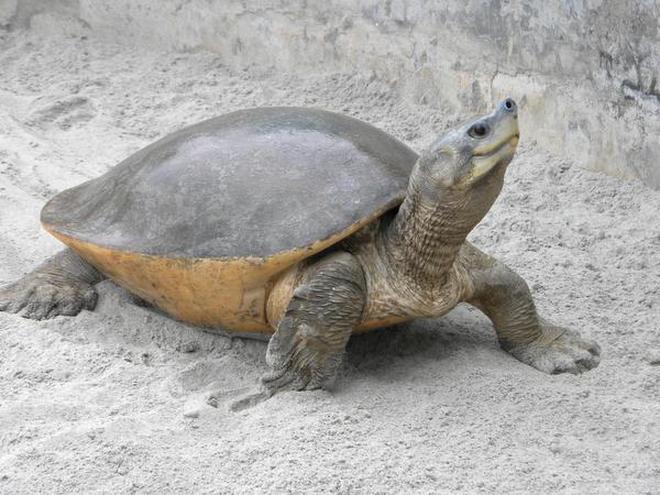
River terrapin at Sajnekhali
Conservation moves in Bengal, U.P., M.P. and Assam seek to save the most-threatened freshwater species
A small group of one of India’s most-threatened turtles, the northern river terrapin, is finding refuge in four breeding ponds in the Sundarbans in West Bengal, under an ambitious plan to repopulate the species in the wild.
The terrapin is one of five freshwater turtles among the world’s 50 most-threatened turtles. Their fragile state is documented in Turtles in Trouble,published for 2018 by the Turtle Conservation Coalition, a consortium of conservation organisations.
India’s “top five” at risk include Batagur baska, the northern river terrapin found in the Sundarbans, and the red-crowned roof turtle, Batagur kachuga,from the National Chambal Sanctuary, spread across Uttar Pradesh, Rajasthan and Madhya Pradesh.
Others are Chitra indica, the South Asian narrow-headed softshell turtle in the gangetic river system, Nilssonia nigricans, or black softshell turtle, encountered in temple ponds in north Bengal and Assam, and Pelochelys cantorii, the Asian giant softshell turtle in the east. The northern river terrapin, the red-crowned roof turtle and giant softshell turtle are critically endangered, says the Red List of the International Union for Conservation of Nature, while the black softshell is extinct in the wild, and the narrow-headed softshell is endangered.
Shailendra Singh, Director of Turtle Survival Alliance - India (TSA) said most threatened freshwater turtles are from Asia: Of the top 25, 17 are from Asia. The figure goes up to 29 among the 50 most threatened.
India makes progress
“China has the highest number, at 6 in the top 25 and 11 among the 50,” Dr. Singh said. But it is India that has progressed with conservation. The optimism comes from 20,000 hatchlings of Batagur kachuga released under the riverine hatchery programme over a decade by TSA and forest departments of Uttar Pradesh and Madhya Pradesh. For Chitra indica a conservation colony has come up at Kukrial in Lucknow and for Nilssonia nigricans, a nest protection initiative in Assam.
There is worry about Pelochelys cantorii, as a survey along the Andhra coast has found only a few specimens. Turtle habitat is being lost due to development, expansion of agriculture, and land and water pollution, besides consumption of the animals and their eggs.

